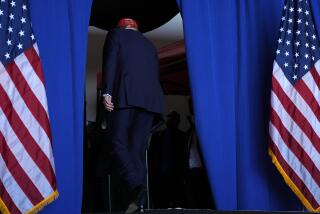Seeds of Downfall in GOP’s Victory
The news has been filled with giddy Republican talk of the 2004 triumph as a realigning election -- one that ushers in, as Newsweek put it, “political dominance that could last for decades, as FDR’s New Deal did.”
The Republicans are living in a fool’s paradise. It’s true that over the next few years Republicans will have enormous power. In the long run, however, they’re doomed. Doomed, I tells ya! Doooomed! OK, I may have gotten slightly carried away there. Perhaps “doomed” overstates things a tad. But President Bush’s political formula does carry the seeds of its own demise.
The classic example of a political realignment, as Newsweek notes, is the New Deal coalition. The New Deal succeeded politically because it delivered popular social programs to its constituents. As FDR’s advisor Harry Hopkins famously described the formula, “tax and tax, spend and spend, and elect and elect.” The Democrats’ New Deal coalition eventually died of two main causes. First, it contained both those Americans most adamantly in favor of segregation (Southern conservatives) and those most adamantly opposed (liberals and blacks). The civil rights movement split that fissure wide open. Second, the Vietnam War -- and the Democrats’ reaction to it -- destroyed the party’s credibility on foreign policy.
Republicans have social fissures of their own. A huge part of the GOP base (the religious right) votes Republican in the hope of enacting a radical social agenda that another part of the GOP base (suburbanites and the business elite) has no intent or desire to carry out. And it’s also possible that Republicans will suffer a Vietnam-style external shock of their own -- a severe recession or a bungled war. (Can’t possibly imagine where the latter could happen, can you?)
The Republicans’ main problem, however, is that their basic political and economic strategy is totally unsustainable. Where the Democrats had tax and spend, Bush has tax cut and spend. One core element of the Bush strategy is to lock in the allegiance of the business community through breaks for corporations, investors and the wealthy, in return for which they will gratefully give the GOP a huge fundraising advantage. Spending is another key element of the plan. Bush wooed the elderly with a prescription drug benefit and rural America with lavish agriculture subsidies.
Politically, it’s working great so far. It may well continue to work great for the next four years. But the government can’t run large structural deficits forever.
When conservatives are confronted with Bush’s record on spending and deficits, they usually reply by admitting that it’s a terrible shame the president hasn’t slashed spending and he really ought to do something about it. Many hoped that Bush, having bribed enough voters to win reelection, would use his second term to enact a single-rate tax code and privatize Social Security. These are ways to get voters to swallow middle-class tax hikes and cuts in popular social programs, both of which are ultimately unavoidable if the rich are going to pay a permanently lower tax rate. Casting the debate as “simplification” (the flat tax) or “ownership” (privatized Social Security accounts), the thinking goes, will make them forget that they’re paying a larger portion of the bill for government and getting less in return.
But even a few weeks after Bush’s reelection those hopes are all but dead. First, Bush administration officials leaked that they would hold off on tax reform until 2006. Given that by then Congress will be facing elections and Bush’s political strength will be on the wane, tax reform advocates agree that enacting tough changes will be impossible.
As for privatizing Social Security, the Republicans have floated the prospect of paying for that not with cuts in benefits or tax hikes but with enormous new borrowing. We would enjoy the benefit -- spiffy new accounts -- today. The bill comes later.
The upshot of both these developments is that a second Bush term means more of the same. Even with full control of the federal government and a president freed of the constraints of reelection, Republicans lack the political will to raise middle-class taxes or cut large spending programs.
Which means that eventually one or all of the following will happen: The budget deficit will drag the economy down; Republicans will have to inflict significant fiscal pain on major elements of their coalition; voters will elect Democrats to tame the deficit. It may take years before the “realignment” falls apart. But it won’t take decades.
More to Read
Get the L.A. Times Politics newsletter
Deeply reported insights into legislation, politics and policy from Sacramento, Washington and beyond. In your inbox three times per week.
You may occasionally receive promotional content from the Los Angeles Times.









